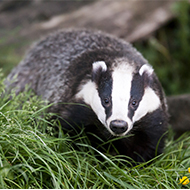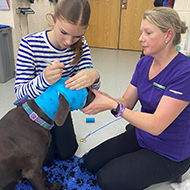Being kept on their own causes rabbits to experience frustration, fear and boredom.
BVA survey reveals that one in five British vets are concerned about rabbits kept as pets
One in five veterinary surgeons in Britain are concerned about rabbits being kept as pets, a survey by the BVA has revealed.
In the Voice of the Veterinary Profession survey, companion animal vets were asked about what types of pets the general public should be discouraged from keeping.
Rabbits were high on the list, with 22 per cent of respondents saying that people should be discouraged from keeping rabbits unless they can be properly looked after.
The overwhelming message from veterinary surgeons is that while many people think rabbits are easy to look after and make ideal pets for children, they can have complex needs.
Many of the respondents expressed concern about single rabbits kept in hutches by themselves. Rabbits are social creatures and need contact with their own kind.
Being kept on their own causes rabbits to experience frustration, fear and boredom. Some of the comments included:
“Rabbits should not be solitary animals left in the hutch 23 hours a day.”
“Rabbits often get forgotten and are kept as single pets.”
“Rabbits are often bought for children who grow bored of them – rabbits can live for a very long time in a small hutch and often get quite neglected.”
A report released recently by the PDSA Animal Wellbeing (PAW) emphasises how serious and widespread the problem is, reporting that in 2013, 65 per cent of pet rabbits were living alone.
Respondents to the veterinary profession survey also remarked that poor husbandry and poor diets were the most commonly seen problems. One vet commented:
"Many rabbits have poor husbandry, nutrition and clinical care. The traditional hutch does not meet their physical, social or environmental needs."
Reflecting on the results of the survey Robin Hargreaves, outgoing BVA president and small animal vet, said: “Pet owners, particularly parents trying to buy a suitable pet for their child, have the very best intentions. But I would urge them to stop, think and ask before purchasing any animal, and give careful consideration to their ability to fully provide for its welfare needs as well as the child’s relationship with the animal.
"Do your research first – ask your vet and read through helpful documents such as the Animal Welfare Foundation’s free Caring For Rabbits leaflet."
The Animal Welfare Foundation's Caring for Rabbits leaflet is free to download at: http://www.bva-awf.org.uk/pet-care-advice/rabbits








